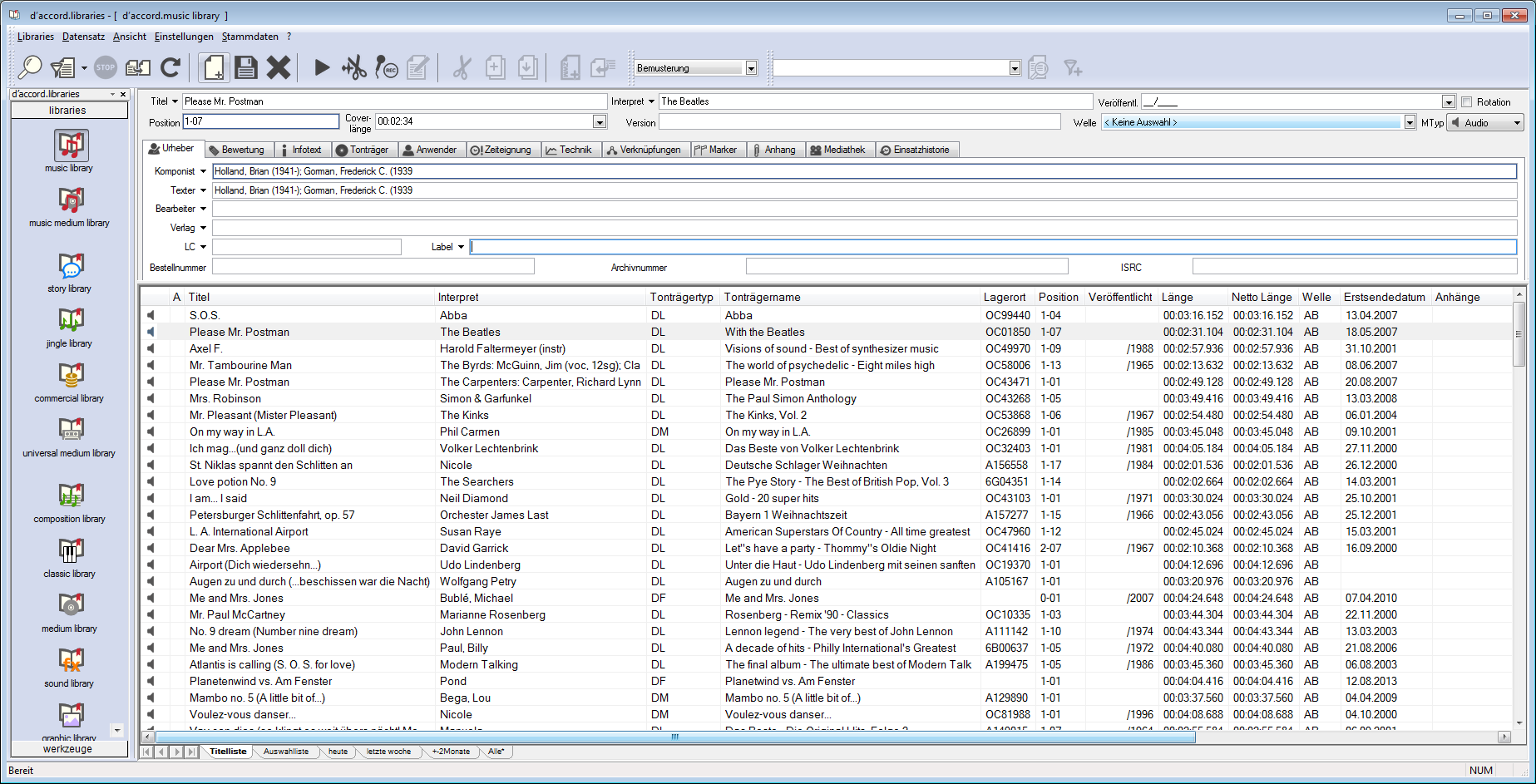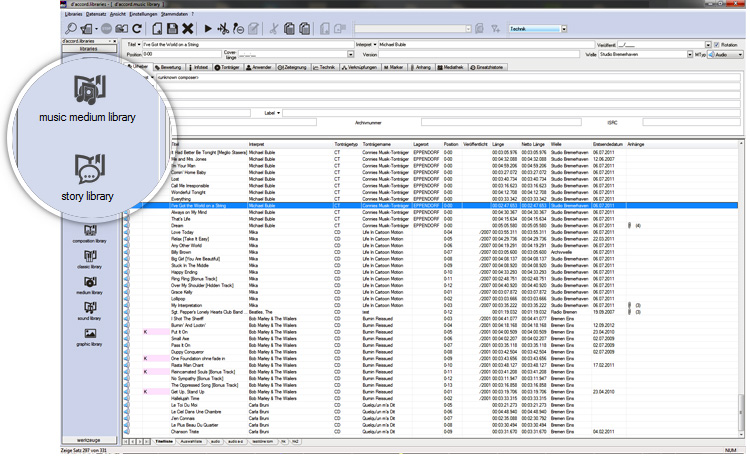The d’accord.libraries make building and managing large multimedia data stocks for broadcasters child’s play.
Each element can be described in detail and stored in the thematically relevant archive along with appropriate metadata.
The archived elements are easy for employees to research, edit and add to as required. The result is multimedia data units that can be integrated into the programme at any time.

Find what you need quickly every time - from millions of data sets.
The d’accord.libraries have been designed from the outset for hectic daily life in media companies. Intelligent, task-specific tools help with searches and navigation in the data stocks. Search queries are executed almost in real time – so that nothing stands in the way of working quickly with the archives any more.
Extensive search
Full text search
Individual search templates
Results pinboard
Metadata brings archive to life.
The d’accord.libraries are based on the consistent storage and management of metadata, so that complete data sets containing all relevant information are obtained. These are then available to all users of the d’accord.radiosuite – whether in the studio or during research or planning.
Extensive metadata
Depending on the entry type, the data sets in the d’accord.libraries can be enhanced with different metadata elements. Thus, for example, ratings for music items can be captured using feature templates, the usage history can be displayed or various audio markers such as intro, fade in and mark in can be stored.
Multimedia attachments
Any number of attachments can be assigned to each data set in the d’accord.libraries. Multimedia pieces with audio, text and video elements can thus be created and archived in a flash. The entire data set is then available to the user in all modules of the d’accord.radiosuite.
Find, manage and edit content with ease.
The d’accord.libraries greatly simplify research and work with content – regardless of the size of the archive. The clear, thematically arranged interfaces enable users to navigate simply through entries and metadata without losing the overview. Numerous tools help with importing, exporting and editing audio material and text.

Varying user interfaces depending on topic
The libraries offer different user interfaces for the various programme elements, which simplifies working with the data in each case: d’accord.story library for spoken-word items, d’accord.music library for music, d’accord.single library for layout elements and other special libraries.
Drag & Drop
Import
All audio material can be imported simply by drag and drop – and the material is automatically converted to house format and stored. Where metadata is present, this is automatically detected and stored in the database accordingly.
Stream specific
deletion dates
Following a defined deletion date, data sets are automatically deleted – provided that no referencing is present. Deletion dates can be set individually for each stream. Data can also be stored long term without a deletion date.
Full drag & drop
integration
Elements can be moved from the d’accord.libraries directly to the d’accord.radiosuite modules by drag and drop. When this is done, all associated information such as presentation texts are also copied and are thus available directly in the studio.
Optimised
format quality
The d’accord.libraries automatically create different audio qualities for the elements they contain, depending on the configuration, so that defined pre-listening, broadcast and archiving formats are available at all times. High-quality productions can also be stored linearly.
Integrated audio and
text editor
Audio elements can be pre-listened to and edited using the integrated d’accord.cut assist audio editor. Texts can be recorded directly into the d’accord.libraries or into d’accord.cut assist. An approximate value of talk time is automatically generated from the word length.
Easy
audio export
To allow audio elements to be transferred quickly and easily to third parties, data sets can be exported into different audio formats with a single click.
One-click
publishing
Podcasts can be created from the d’accord.libraries with a single click and released according to defined rules. Similarly, entire pieces can be exchanged with other radio stations via d’accord.komod.
Open for big things - without big outlays.
The d’accord.libraries are not an encapsulated application. Far from it. There are a wide range of tried-and-tested interfaces for editors, rotation solutions and gateways. For individual requirements, a SOAP interface is available, enabling new integration projects to be realised efficiently.
Audio editor
interfaces
Different audio editors can be integrated by means of the box concept. This can be extended to any editor, provided that the editor has its own interface.
Automatic music
sampling
Data sampled by the music industry is automatically imported and made available in the d’accord.music or d’accord.classic library. All metadata included with the data is also stored. Thus, new titles can be integrated into the programme immediately after they are released.
Recordings in
realtime
Recordings being made are automatically stored in the d’accord.story library and can be monitored and edited with d’accord.cut assist even while recording is still in progress. Thus, new material is ready for further use very quickly.
SOAP
The open standard
All objects contained in the d’accord.libraries can – subject to the rights administration policy – be written to and read via a SOAP interface. As a result, the d’accord.libraries can be linked to any application – from streaming radio projects through to highly complex database integration.
Each person sees and does only what they should see and do.
Content management is a highly sensitive issue for broadcasters. Unauthorised or inadvertent changes to broadcasting material can have far-reaching consequences. For this reason, the d’accord.libraries uses the tested and fully integrated roles and rights system of the d’accord.radiosuite.
Comprehensive
rights management
For different d'accord.libraries different user rights can be set up. These can then be differentiated for each user according to stream, role and function.


